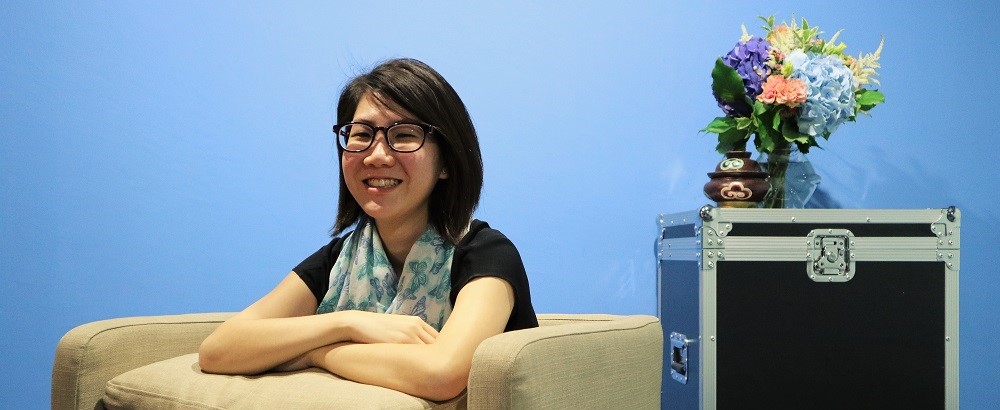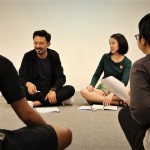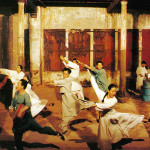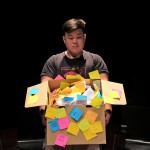
Gua Khee getting comfortable for our interview. Photo: Gwen Pew
“When was the last time you had a conversation with someone?” one of the cast-facilitators asked. We were at the first trial run of HOT POT TALK: Theatre & the Arts, the latest work by independent theatre practitioner Gua Khee Chong. Some of us remembered our last conversation vividly. Others hesitated.
The cast-facilitators asked a few more questions, and with the ‘hot pot’ more warmed up, we chose our own ‘soup bases’ to form smaller groups to have further conversations.
That is essentially the point of HOT POT TALK. Framed as a theatrical journey into conversation, it’s an experiment for people from different worlds to encounter each other and talk – in this case – about issues in the arts. Supported by Centre 42’s Basement Workshop programme, the event is open to the public over three weekends in September. We chat with Gua Khee to find out more about the piece.
How did the idea for HOT POT TALK come about?
I’ve always been interested in Theatre of the Oppressed, Forum Theatre, and pieces in which the conventional relationship between audience and performers is broken or challenged. As a result, last year I did a piece at The Substation, which can actually be seen as an earlier prototype of the form we are using in HOT POT TALK. That piece was called An Un-Tea Party, which is a reference to Alice in Wonderland and the “un-birthday” party. It was intended as an interrogation/exploration of The Substation’s tagline, “a home for the arts”. We had three “auntie” facilitators – myself, a dance artist, and a filmmaker – and interested audience could enter the room at set timings to have conversations with us. However, it was quite small scale and simple, so I was interested in exploring how that format could be translated into something that is more theatrical.
At the same time, I have been exploring the idea of stories and conversations. In particular, I was having a lot of conversations with my parents last year, as I was transitioning from a full-time position in a theatre company to being a freelance practitioner. While I was working at Drama Box, it was easier for my parents to understand what I was doing. To them it’s like, “oh, you’re working in a theatre company, okay can.” And financial security was assured, so that helped. But when I was transitioning into becoming a freelancer, a lot of questions started coming up. Like, “so what will you be doing?” or “what do you mean by ‘making’ theatre?” I didn’t think this was unique to my situation, so I started asking other practitioners about their stories, at which point I realised the amount of frustration around such conversations, as well as the subsequent avoidance of having such conversations. This was the original impulse for HOT POT TALK – to bridge theatre and society, and to have this playful theatrical space in which practitioners and other people can have such conversations in which they explore commonalities and stories of ‘why’, like why we do what we do.
What’s the story behind the hot pot metaphor?
I actually started with a soup metaphor for the process, to illustrate how I saw the devising process with the team. During the initial rehearsals, I also used the metaphor to generate further thoughts and concerns about the process of the piece as well as the piece itself, so the team came up with questions like “what ingredients do we definitely want to add to the soup?” and “what do we do if someone tries to add in an unwanted ingredient?” But we felt that it wasn’t the correct metaphor for the show itself.
Eventually, we found our way to the idea of a hot pot, which we thought best illustrated our desire for the audience to be part of the ‘cooking’ process – they are not just consuming something we serve them, but ‘cooking’ and ‘eating’ together with us. Hot pot also has connotations of a celebration and festivity – it’s usually quite a special occasion to get that number of people together in the same room. And while everyone starts off with more or less the same soup base, it can taste very different by the end depending on the ingredients that are added into it.
Tell us about the devising process for this piece.
A key framing I use in my work is the idea of ‘propositions’. I see my works as propositions to the audience and to society, for them to respond to. And in the same way, I think about bringing activities and games into the devising process as my propositions to the team. With these propositions, the team then has something to respond to, disagree with, or even deconstruct, so then the devising process can become richer and more complex much quicker.
Another framing I use is Paolo Freire’s concept of action/reflection, so during the devising process, we usually start by doing something, then we’d talk about it, then we’d do something again. So there has been a lot of conversations.
The dynamics amongst the three cast facilitators is also very, very important. So I assigned them to take turns to lead warm ups, so that they can get a sense of how each other facilitates, and what their theatrical language is.
How did you assemble the team of facilitators?
For this piece, I felt that having a highly diverse team was really important, so that they can bring all their different perspectives to the devising process as well as to their facilitation in the piece. Another consideration was their facilitation and listening ability, as that is also crucial for the piece to work. So if you look at the cast-facilitators, you can see that they have quite different backgrounds and they also work in fairly different circles within the theatre industry. Their focus is slightly different as well – although all three identify as actors, Chang Ting Wei and Adib Kosnan are also educators. Adib further does writing and directing work, while Shaiful Risan also does production, technical work, as well as hosting/emcee work.
How important is the role of the facilitators in HOT POT TALK?
They play an incredibly important role! The cast-facilitators are there to ‘difficultate’ the conversations that are at the core of the show. This means while they need to facilitate a safe space to support the sharing of potentially sensitive stories, they also need to be alert and share research or stories to challenge the audience, so that conversations don’t become just an echo chamber of opinions. For instance, if a particular group consists of purely practitioners, then I think the cast-facilitator can frame the conversation as an opportunity to share about strategies or approaches towards certain common struggles in the industry, or to hear about different aspects of the industry. If it’s a mixed group of practitioners and their relatives or friends, which would be most ideal, then it’s about helping to emerge the commonalities so that audience have a better understanding of each other’s worlds.
But it’s also about how much the audience chooses to participate. In HOT POT TALK, we are trying to ensure a wider variety of ways that the audience can navigate the piece. It’s like how you have different condiments and ingredients in a hot pot – you can choose how you want to flavour the soup for everyone, or perhaps just for yourself.
Who do you hope will come for HOT POT TALK, and what do you hope to achieve with it?
I’m more than happy if the general public hears about this and wants to come, but I’m most interested in having practitioners come with the people whom they’re interested to have such conversations with, such as friends or family members. This preference is really to ensure a higher possibility of audience engaging with the issues even after the show. We are trying to actively encourage this through our ticketing as well, with plans for ‘friends and family’ package discounts.
We hope that HOT POT TALK can be a starting point for conversations, or a way to deepen existing conversations. If they talk about issues that were raised in the piece afterwards, or if they share their perceptions of the industry – regardless of whether or not they agree on the issue – then I think the piece would have achieved a key aim of the team.
Interview by Gwen Pew & Daniel Teo on 19 June 2017
Published on 14 July 2017
Find out more about HOT POT TALK: Theatre and the Arts here, and catch the show at Centre 42 on 9, 10, 16, 17, 23 & 24 September 2017.





